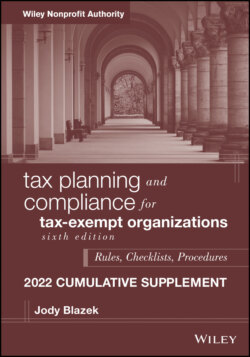Читать книгу Tax Planning and Compliance for Tax-Exempt Organizations - Jody Blazek - Страница 34
Law
ОглавлениеIRC Section 501(c)(3) provides for the recognition of exemption of organizations that are organized and operated exclusively for religious, charitable, or other purposes as specified in the statute. No part of the net earnings may inure to the benefit of any private shareholder or individual.
Treasury Regulation Section 1.501(c)(3)-1(a)(1) states that, in order to be exempt as an organization described in IRC Section 501(c)(3), an organization must be both organized and operated exclusively for one or more of the purposes specified in such section. If an organization fails to meet either the organizational test or the operational test, it is not exempt.
Treas. Reg. Section 1.501(0(3)-1(c)(1) provides that an organization will be regarded as operated exclusively for one or more exempt purposes only if it engages primarily in activities which accomplish one or more of such exempt purposes specified in IRC Section 501(c)(3). An organization will not be so regarded if more than an insubstantial part of its activities is not in furtherance of an exempt purpose.
Treas. Reg. Section 1.501(c)(3)-1(d)(1)(ii) provides that an organization is not organized or operated exclusively for exempt purposes unless it serves a public rather than a private interest. To meet this requirement, it is necessary for an organization to establish that it is not organized or operated for the benefit of private interests.
Treas. Reg. Section 1.501(c)(3)-1(d)(2) provides the term “charitable” is used in IRC Section 501(c)(3) in its generally accepted legal sense and includes relieving the poor and distressed or the underprivileged, combating community deterioration, lessening neighborhood tensions, and eliminating prejudice and discrimination.
Treas. Reg. Section 1.501(c)(3)-1(d)(3)(i) provides that the term “educational,” as used in IRC Section 501(c)(3), relates to the instruction of the public on subjects useful to the individual and beneficial to the community.
Revenue Ruling 69-175, 1969-1 C.B. 149, describes an organization created to provide bus transportation for school children to a tax-exempt private school. The organization was formed by the parents of pupils attending the school. The organization provided transportation to and from the school for those children whose parents belonged to the organization. Parents were required to pay an initial family fee and an additional annual charge for each child. The Service determined that “when a group of individuals associate to provide a cooperative service for themselves, they are serving a private interest.”
In Revenue Ruling 71-395, 1971-2 C.B. 228, a cooperative art gallery was formed and operated by a group of artists for the purpose of exhibiting and selling their works and did not qualify for exemption under IRC Section 501(c)(3). It served the private purposes of its members, even though the exhibition and sale of paintings may be an educational activity in other respects.
In Revenue Ruling 73-127, 1973-1 C.B. 221, the Service held that an organization that operated a cut-price retail grocery outlet and allocated a small portion of its earnings to provide on-the-job training to the hardcore unemployed did not qualify for exemption. The organization's purpose of providing job training for the hardcore unemployed was charitable and educational within the meaning of the common law concept of charity; however, the organization's purpose of operating a retail grocery store was not. The ruling concluded that the operation of the store and the operation of the training program were two distinct purposes. Since the former purpose was not a recognized charitable purpose, the organization was not organized and operated exclusively for charitable purposes.
Revenue Ruling 77-111, 1977-1 C.B. 144, in Situation 1, held that an organization formed to increase business patronage in a deteriorated area by providing information on the area's shopping opportunities, local transportation, and accommodations is not operated exclusively for charitable purposes and does not qualify for exemption under IRC Section 501(c)(3). The overall thrust is to promote business rather than to accomplish Section 501(c)(3) objectives exclusively.
In Better Business Bureau of Washington, D.C., Inc., v. United States, 326 U.S. 179 (1945), the Supreme Court held that the presence of a single nonexempt purpose, if substantial in nature, will destroy a claim for exemption regardless of the number or importance of truly exempt purposes. The Petitioner's activities were largely animated by nonexempt purposes directed fundamentally to ends other than that of education.
In Ginsberg v. Commissioner, 46 T.C. 47 (1966), the court considered a collective organization created to dredge waterways. The majority of the funds for this activity came from owners of property adjacent to the waterways. The court found that the primary beneficiaries were the adjacent property owners. Any benefit to the general public because these dredged waterways would be a safe harbor for boats during a storm was secondary. Therefore, the organization was not exempt because of the significant private benefit provided.
